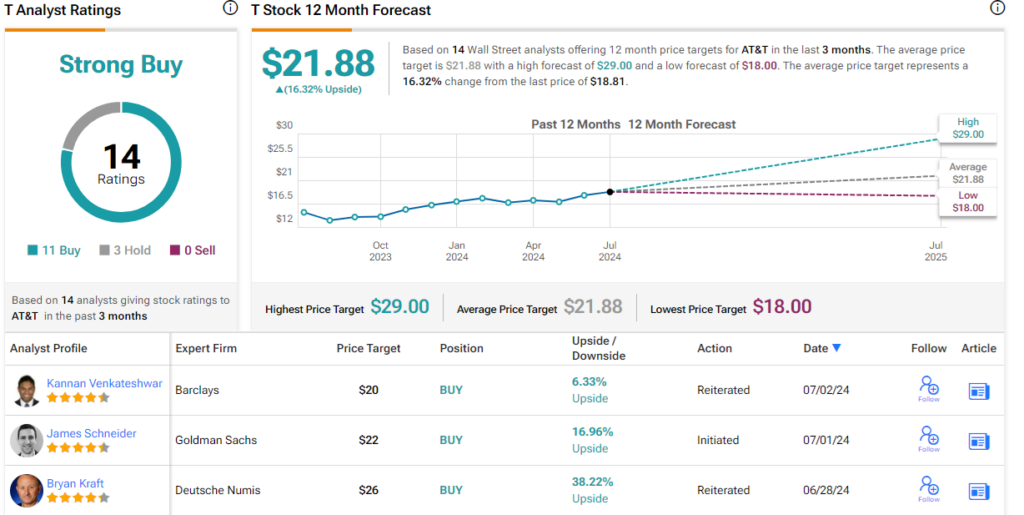The tech world has seen a raft of changes in the past decade, starting with the rollout of 5G networks on a nationwide scale and continuing with today’s boom in generative AI. These technologies have impacted every technology segment, in ways that are still unfolding. The banking giant Goldman Sachs has taken a deep dive into the ways that these changes are reverberating within tech’s telecom segment and has come to some interesting conclusions.
Meet Your ETF AI Analyst
- Discover how TipRanks' ETF AI Analyst can help you make smarter investment decisions
- Explore ETFs TipRanks' users love and see what insights the ETF AI Analyst reveals about the ones you follow.
First, the bank notes that 5G’s main contribution was to expand the area of competition. It hasn’t been the advertised world-changer, but it has broadened the area of access to online networks – putting more customers within reach of the telecom companies, especially for wireless networking providers. Second, AI has created a voracious appetite for data center services, which in their turn rely on broadband connections and networking – creating openings for network providers. Additionally, AI technology promises to boost efficiency across the board.
Looking at the bigger picture, Goldman’s James Schneider says, “We believe the US telecom industry is in a state of transformation. US telecom operators have refocused on their core business, after having emerged from a period as conglomerates marked by shareholder capital destruction. For the first time in a decade, we see the US wireless operators entering a period where both competitive intensity and capital intensity are moderating simultaneously. We see this backdrop driving healthier growth and margin dynamics, with potential for significant capital returns and stock re-rating.”
We’ve used the TipRanks platform to look up the broader view on 2 names that the Goldman Sachs expert has tapped as ‘leading the charge’ in the telecom industry. These are well-known companies, and according to the analyst consensus, both boast Buy ratings. Here are the details.
Verizon Communications, Inc. (VZ)
We’ll start with Verizon Communications, whose old tag line ‘Can you hear me now?’ has become a meme. Verizon is one of the largest firms in the US telecom world, with a market cap of $173 billion and annual revenue in the neighborhood of $133 billion. The company is one of the top three largest wireless providers in the US market, with approximately 114 million subscribers.
Verizon started rolling out its 5G network in 2019 and has been expanding it ever since. The company supports its 5G operations with a strong spectrum position and an extensive network of fiberoptic cables and boasts that it has America’s most reliable 5G carrier network. Verizon’s potential market here is huge, as more than 200 million people live in areas reached by the company’s 5G service.
This large-cap telecom giant bills itself as a company dedicated to connecting people. In addition to its 5G and 4G wireless networks and its fiberoptic cable system, the company also offers public mobile edge computing, building on both 5G connectivity and AI technology. Verizon sells this service as a way of bringing high-quality cloud computing to a wide range of connected devices, with low latency for improved real-time operations.
In its last quarterly report, giving results for 1Q24, Verizon generated revenues of $33 billion, although relatively flat year-over-year (just 0.3% growth) and $230 million below the estimates. The bottom line, of $1.15 per share by non-GAAP measures, was 3 cents per share better than had been expected. The company’s wireless service was a main driver of the results, and wireless revenue expanded 3.3% year-over-year to reach $19.5 billion, or 59% of the total revenue.
Checking in with Goldman Sachs’ James Schneider, we find the analyst upbeat on Verizon’s strong position in the wireless industry and positive on the company’s ability to expand its customer base. He writes, “We believe Verizon is beginning to regain momentum in its core wireless franchise, and think the company will significantly benefit from fixed wireless in both its consumer and business franchise. We think the stock can become more appealing to a wider group of investors as Verizon is on a path to sustain revenue and EBITDA growth, with de-levering allowing for capital returns/buyback – all of which should be multiple enhancing.”
Quantifying his stance, Schneider puts a Buy rating on VZ stock, with a $50 price target that points toward a one-year upside of 20%. (To watch Schneider’s track record, click here.)
Overall, VZ shares have earned a Moderate Buy rating from the Street’s analysts, based on 12 reviews that break down to an even 6 Buys and Holds, each. The stock is selling for $41.53 and its $45.58 average price target implies it will gain 10% in the year to come. (See Verizon’s stock forecast.)

AT&T (T)
The next stock on our list has, like Verizon, built itself into an iconic brand. AT&T is one of America’s legacy telecom firms, a $134 billion giant of the industry. The company raked in some $122 billion in revenue during 2023, and is one of the largest telecom companies in the world. The company has built itself into one of the largest wireless providers in the US market, with more than 71 million subscribers on its 5G wireless network and 8.6 million on its fiberoptic broadband.
One key to AT&T’s success is its diversification. While wireless service is the company’s core business, it also provides a wide range of additional communications services, including cable TV, internet, and digital television. AT&T is a business descendant of the old Bell telephone companies, and to this day remains an important provider of landline telephone services in the US.
Like Verizon, AT&T has been playing an important role in the introduction and expansion of 5G networking into the US market. The company’s connection to 5G allowed it to create its Internet Air service, a reliable wireless internet service delivered over the 5G networks. The service has plans for individual as well as commercial and business customers.
This company’s varied telecom activities generated $30 billion worth of revenues during the first quarter of this year. That figure was 0.4% below the 1Q23 total and missed the forecast by $510 million. At the same time, AT&T’s adj. EPS of 55 cents, was 2 cents per share above the estimates. The company’s Q1 cash generation was sound; AT&T reported $7.5 billion in cash from operating activities in the quarter, up $900 million from the prior year. The company’s free cash flow was also strong, $3.1 billion, for a y/y gain of $2.1 billion.
Checking in again with Schneider and the Goldman view on T, we find the analyst optimistic, basing his view, as he did for Verizon, on the company’s strong position as a service provider. Schneider writes of this telecom company, “We think AT&T is positioned to continue its transformation as it re-focuses on its core business and extends its fiber broadband leadership, while maintaining growth in its wireless franchise. As the company executes, we think the stock can begin to better reflect this improving fundamental backdrop – particularly as the company delivers more consistent financial performance while paving the way toward enhancing capital returns via a potential buyback.”
These comments fully support the analyst’s Buy rating, while his $22 price target implies T shares will gain 17% in the next 12 months.
This telecom leader has a Strong Buy consensus rating from the Street, based on 14 reviews that include 11 to Buy and 3 to Hold. The shares are currently trading for $18.81, and their $21.88 average target price suggests a potential one-year upside of 16%. (See AT&T’s stock forecast.)

To find good ideas for stocks trading at attractive valuations, visit TipRanks’ Best Stocks to Buy, a tool that unites all of TipRanks’ equity insights.
Disclaimer: The opinions expressed in this article are solely those of the featured analysts. The content is intended to be used for informational purposes only. It is very important to do your own analysis before making any investment.
















